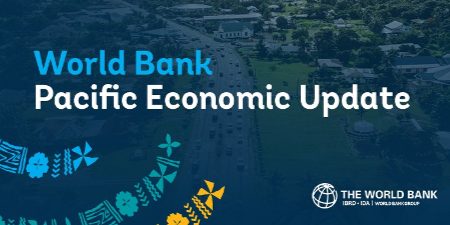SOLOMON Islands must create a more favorable business environment by adjusting regulations to attract both international and domestic investors.
This was underscored by the World Bank Senior Economist for the Macroeconomics, Trade, and Investment Global Practice for Solomon Islands and Vanuatu, Lodewijk Smets in an interview with local media Tuesday.
Mr Smets was speaking following the World Bank’s launch of its latest Pacific Economic Update in Suva, Fiji, which called for a significant increase in investment to address the region’s slowing economic growth.
The report, ‘Diminishing Growth amid Global Uncertainty: Ramping Up Investment in the Pacific,’ emphasizes the urgent need for targeted investments to create jobs, improve infrastructure, and build resilience against climate change in the face of global uncertainties.
He noted that investment growth in the Pacific, including domestic firms, government and foreign investments, is slowing.
“If you exclude Fiji’s investment growth, the region would show zero percent growth, and that’s not what we want to see.
“We want to see an acceleration of investment because, with it, comes knowledge, technology, and financial benefits,” Mr Smets said.
He emphasized the need for the government to enhance services for the private sector.
“For example, if someone wants to start a business, the process should be fully digital. Paying fees should also be digital. It’s about improving government-to-business services and creating a more viable business environment.”
Mr Smets pointed out that in Solomon Islands, the costs of electricity and energy are extremely high.
“If you can lower electricity costs, you can retain investment,” he said. “Efficient infrastructure, such as transportation, roads, and connectivity between the islands, is also crucial.”
Mr Smets added that if electricity costs are reduced, infrastructure is improved and the overall business climate is enhanced, investors will start looking toward Solomon Islands.
“Additionally, investment promotion efforts must be improved to attract foreign investments,” he said.
“For instance, the Ministry of Commerce, Industry, Labour, and Immigration (MCILI) is considering amendments to the Foreign Investment Act to facilitate investment promotion by establishing an Investment Authority to attract investors,” he highlighted.
Last month, the World Bank, in partnership with the Ministry of Finance and Treasury, launched the Country Economic Memorandum/Sources of Growth Study.
This report highlights opportunities to boost economic growth through digitalization, better transport connectivity, and urban planning, alongside efforts to stimulate private-sector investment in tourism, agriculture, and fisheries.
Mr Smets also mentioned the existence of a Joint Policy Reform Group comprising donors who work with the government to discuss critical reforms.
“We discuss how to improve the business environment, reduce energy costs, and enhance governance. It’s a forum for dialogue where we support the government through analytical work and financing,” he said.
“It’s a two-way dialogue—we listen to the government to understand their priorities, and then we bring our analytical work to the table for discussion,” he added.
By EDDIE OSIFELO
Solomon Star, Honiara









